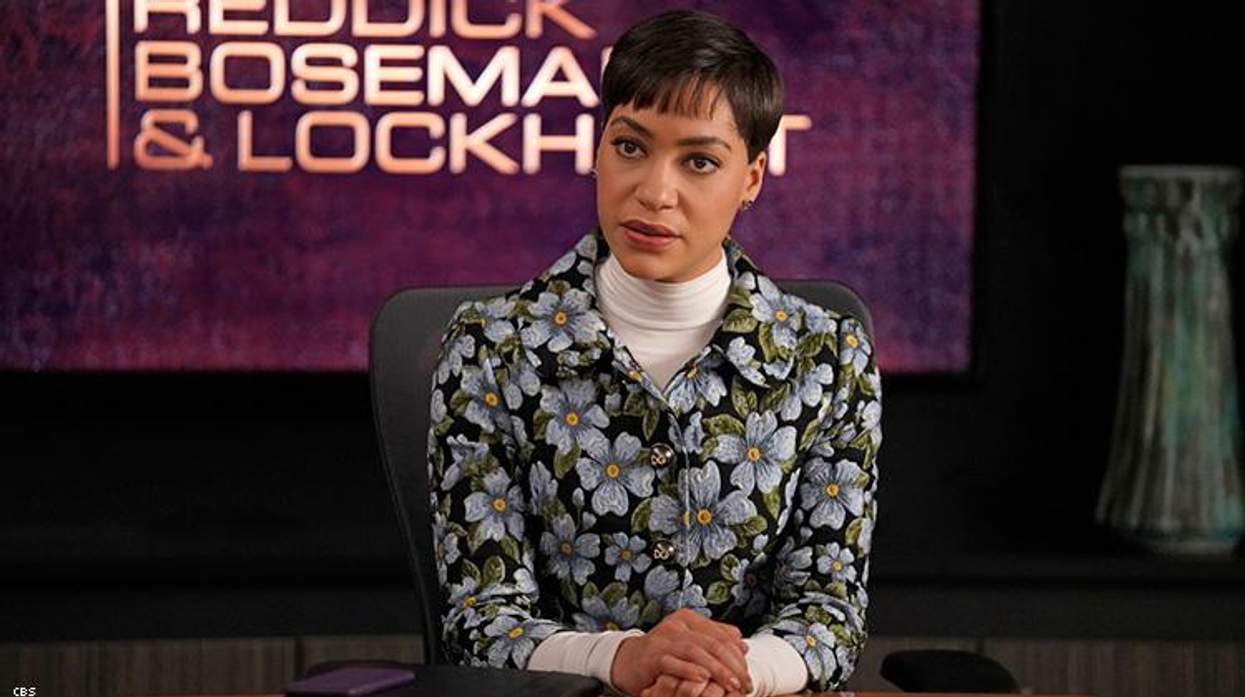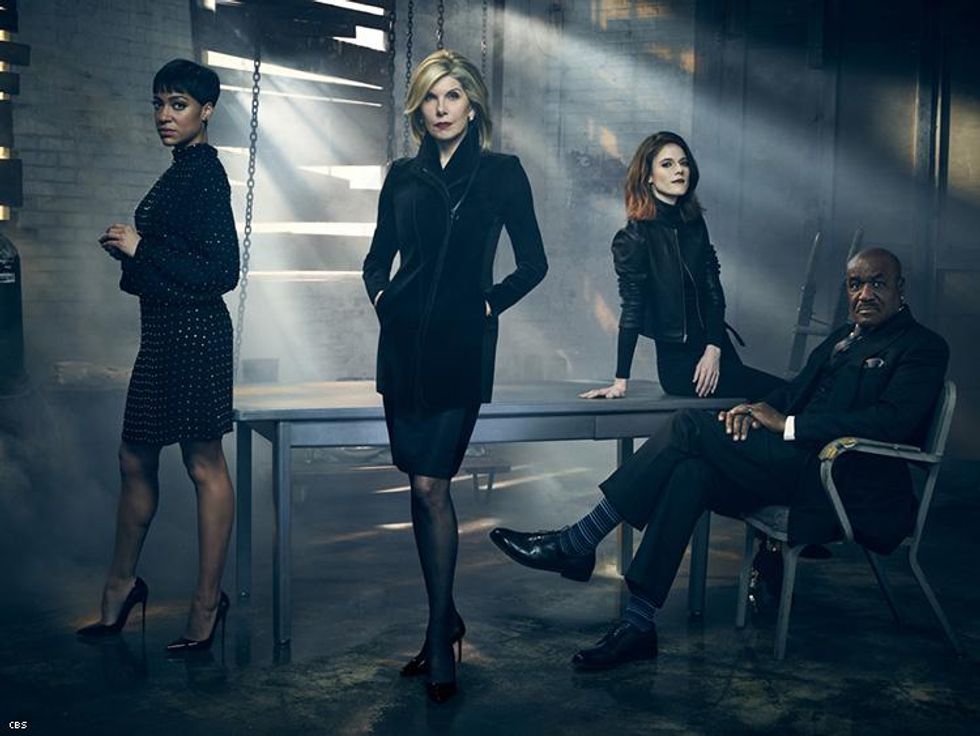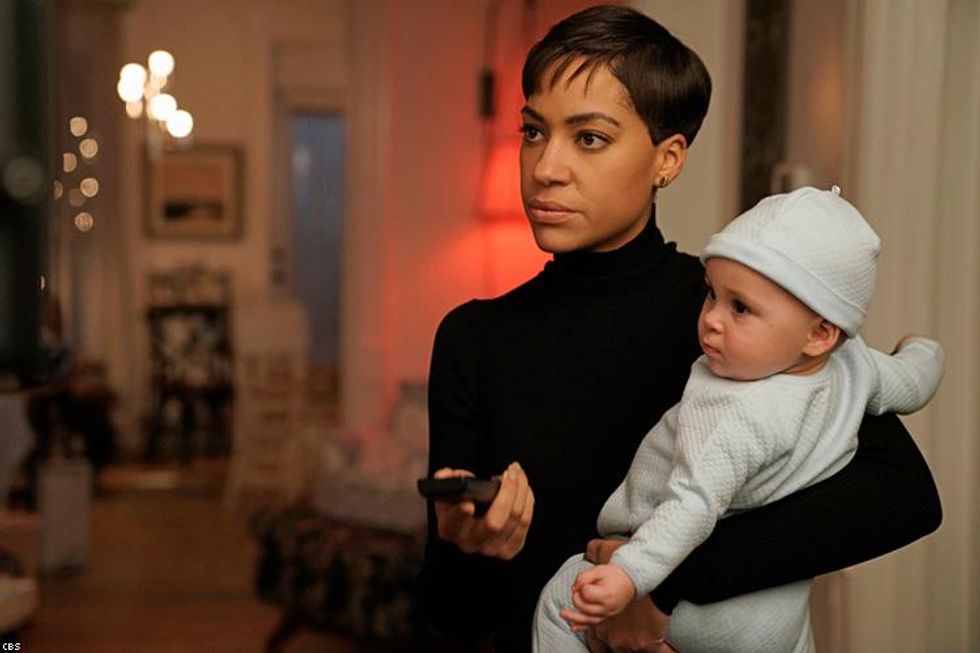Arguably TV's most audacious series, The Good Fight exploded into its third season with a #MeToo story that tested the limits of the show's characters to protect -- or not -- men with towering reputations in their respective communities who are also exposed as sexual predators. It's no surprise that the series that has unflinchingly rebuked the Trump administration with storylines that invoked the possibility of his impeachment, Stormy Daniels, and the alleged golden shower tape would excavate the moral limitations of its characters.
From The Good Wife's creators Michelle and Robert King, The Good Fight, which stars Christine Baranski reprising her Good Wife character, Diane Lockhart, often veers from larger-than-life Shakespearean to absurdist with ease. This week's episode, titled "The One With Lucca Becoming a Meme," deploys the horrifying trend of "Beckys" on the phone -- self-righteous, racist white women calling the police on people of color for simply living their lives -- to dig into race relations, not only in public spheres but at the show's primarily black law firm, Boseman, Reddick & Lockhart. For Cush Jumbo, the British stage and screen actress who plays attorney Lucca Quinn, the story of her character encountering a "Becky" who mistakes her for being the nanny of her own child and subsequently calls the police on her, is personal.
"All the stuff with Lucca being mistaken for the nanny happened to me a couple of times when I had my son. These are real things that happen to people," Jumbo, who is biracial, tells The Advocate about the Kings' commitment to leaning into political and social issues.
"I had no idea that the Kings were going to write that into the season, and they had no idea that it had happened to me -- not to that level [of the story]. Police weren't called," she says.
Last season, the Kings wrote Jumbo's real-life pregnancy into Lucca's storyline, giving the driven, pragmatic attorney introduced in The Good Wife's final season the challenge of determining how to balance her career with having a baby with a man she chose not to be with. In a series that mines stories from everything from current political quagmires to sex scandals, injecting Schoolhouse Rock!-style explainers into its episodes, it makes complete sense that the writers would touch on issues of race via the "Becky" phenomenon.
The Good Fight has ripped stories from the headlines since day one, as did its predecessor, but the Kings writing the story of a nosy white woman assuming Lucca is the nanny and then calling the police delves into the psychological ramifications of being treated as other.
The woman who mistook Jumbo for her infant son's nanny in New York City did not dig her heels in like the one in the episode, but there was a ripple effect.
"She was completely mortified that she'd mistaken me. She was embarrassed and so upset, so apologetic," Jumbo says.

Cush Jumbo, Christine Baranski, Rose Leslie, Delroy Lindo
A seasoned stage actress who grew up in London, Jumbo appeared as Marc Antony in an all-female production of Julius Caesar at the famed Donmar Warehouse. In 2013, she wrote and starred in the one-woman play Josephine & I, about Josephine Baker. Beyond landing the role of Lucca since moving to New York, Jumbo also starred opposite Janet McTeer in Shakespeare in the Park's The Taming of the Shrew in 2016. Despite her success, one aspect of living in New York City that Jumbo hadn't considered was how Americans would perceive her as a biracial woman.
"I'm from London, and there's a huge population of biracial people there. In the school where I grew up, nearly everybody was biracial. So there were all these different shades and colors and versions of a person, and nobody ever thought about it," Jumbo says. "If I was in London in a park, there's just no way in hell anybody would mistake me for the nanny. Because there are nannies in London, but they're not people of color."
"It's quite a specific New York thing, and so it just struck me that, Oh, my God, this is completely reflective of one culture I'm living in that I don't understand because I've never thought about my race as my son's," she adds.
In the episode that has Lucca becoming a meme, the white woman overhears her take a phone call from her colleague Maia (Rose Leslie) who's been arrested for drugs left in her car. In classic Good Fight style, the conversation swerves from Lucca doling out legal advice to Maia before adding that she needs a drink after singing 12 verses of "Baby Shark" at a Mommy & Me class. Of course, Lucca dives into a few of the verses for Maia's benefit. The conversation catches the interest of the woman who accuses Lucca of ignoring her son.

"I found him in Whole Foods in the peanut aisle. I love peanuts," Lucca sarcastically tells the woman when she's questioned about his care. The woman follows Lucca to her car and an argument ensues as Lucca struggles to close her son's stroller. As is the case these days, someone catches the whole thing on a video that goes viral.
Jumbo's personal experience with the woman assuming things about her based on race wasn't peppered with verses of a children's song and she didn't land as a meme on social media, but the incident had wide-reaching implications.
"You start to think about all the other ways that maybe I could be reflected badly in some way, like what if I go to pick up my kids in school when they don't think I'm his mom? Or will people assume that I'm not his mom because he's lighter than I am? Will he be ashamed of me in some way, because I'm darker?" Jumbo says. "All these things that never would have crossed your mind before, until now. These are thoughts that you don't wanna have in there. But they go in there."
The Good Fight is issues-oriented television like none other. While a show like The Handmaid's Tale paints stark allegories around the policies the Trump administration has wrought, The Good Fight dares to name and call out Donald Trump directly. Of walking onto a set where she knows often troubling issues of the day will be tackled, including in an upcoming episode on "shadeism" within the firm, Jumbo says, "Overall, it's more cathartic than anything."
"We've just been shooting and discussing a lot about shadeism within the firm, where Lucca stands as a black woman [and] the opinion of her in the firm, what her opinion of herself is, and how you kind of have to pick a box of where you're going to be so that you can be the kind of black or the kind of gay or the kind of person that other people want you to be," Jumbo says.
"I find that stuff really sensitive in the best kind of way because when we shoot it and we make it, we end up having discussions on set about it. And possibly with people that normally wouldn't ask those questions."
New episodes of The Good Fight drop Thursdays on CBS All Access.







































































Charlie Kirk DID say stoning gay people was the 'perfect law' — and these other heinous quotes